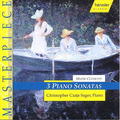
$6.99
 
|
Muzio Clementi (23 January 1752 – 10 March 1832) was a classical composer, and acknowledged as the first to write specifically for the piano. He is best known for his piano sonatas and his collection of piano studies, Gradus ad Parnassum.
Muzio Clementi was born in Rome on 23 January 1752, the first of seven children, to Nicolo Clementi (1720–89), a silversmith, and Magdalena, née Kaiser. His musical talent became clear at an early age: by age 13 he had secured a post as organist at his home church of St Lorenzo in Damaso.
In 1766, Sir Peter Beckford (1740-1811), a wealthy Englishman and cousin of the eccentric William Beckford, took an interest in the boy's musical talent, and struck a deal with Nicolò to take Muzio to his estate of Steepleton Iwerne, just north of Blandford Forum in Dorset, England — where Beckford agreed to provide quarterly payments to sponsor Muzio's musical education. In return for this education, he was expected to provide musical entertainment at the manor. It was here that he spent the next 7 years in devoted study and practice at the harpsichord. His compositions from this early period, however, are few, and they have almost all been lost.
In 1770, Clementi made his first public performance as an organist. The audience was very impressed with his playing, beginning what at the time was one of the most successful concert pianist careers in history. In 1774, Clementi was freed from his obligations to Peter Beckford, and he moved to London, where among other accomplishments he made several public appearances as a solo harpsichordist at benefit concerts for a singer and a harpist, and served as "conductor" — from the keyboard — at the King's Theatre, Haymarket for at least part of this period. His popularity grew in 1779 and 1780, due at least in part to the popularity of his newly-published Opus 2 Sonatas. His fame and popularity rose quickly, and he was considered by many in musical circles to be the greatest piano virtuoso in the world.
Clementi started a European tour in 1781, when he travelled to France, Germany, and Austria. In Vienna, Clementi agreed with Emperor Joseph II to enter a musical duel with Wolfgang Amadeus Mozart for the entertainment of the Emperor and his guests. Each performer was called upon to improvise and perform selections from his own compositions. The ability of both these composer-virtuosi was so great that the Emperor was forced to declare a tie at the Vienese court that day on 24 December 1781.
|
